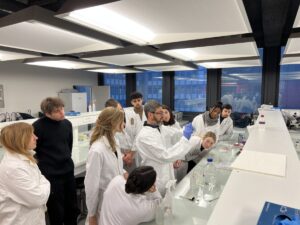MatTek visits Sorbonne University in Paris to deliver its First Annual University Course

MatTek has taken the next step in its education program by delivering a curriculum in the Master of Biotechnology at the prestigious Sorbonne University in Paris, France. The world’s leading producer of 3D human reconstructed tissues as an alternative to animal testing, MatTek has a long commitment to share its expertise and to educate the next generation of scientists about this technology.
In December 2022, Dr. Christian Pellevoisin, MatTek’s Scientific Director and Toxicologist delivered a one-week course on Predictive Toxicology and Tissue Engineering. An immersive experience for 40 international students that included lectures on toxicology, in vitro methods, and tissue engineering, as well as a hands-on laboratory practical where the students evaluated in vitro the irritation potential of chemicals and medical devices according to OECD and ISO validated protocols.This course was also an opportunity to illustrate the bioconvergence promoted by BICO our parent company by inviting Pierre Alexandre to speak about the contribution of bioprinting with a live demonstration of the BIO X.
“It was a stimulating challenge to transmit our knowledge and ground experience of animal replacement in toxicology to this young generation of high-level, highly motivated students, many of whom are in work-study programs in biotech and pharmaceutical companies,” said Pellevoisin. “I would like to thank them for their enthusiasm but also Professors Sébastien André and Sophie Louvet, in charge of this master’s program, for their welcome and their support in the organization of this course.”
“For decades, we have relied on animals to give us information on how a product, or a compound, or drug will affect humans,” said Pellevoisin. “Yet, in addition to the ethical issue, the morphological, biological, and physiological differences raise questions about the systematic use of animals as models for humans. We need more predictive solutions for effects in humans to improve and accelerate the development of new consumer products as well as medical treatments.”
For over 30 years, MatTek has developed and produced lab-grown human tissues that are biologically active and mimic the behavior of human organs. The technology has been used successfully and validated as alternatives to animal testing. This is because it provides better insight into human biological responses than laboratory animals.
“For decades, we have relied on animals to give us information on how a product, or a compound, or drug will affect humans,” said Pellevoisin. “Yet, in addition to the ethical issue, the morphological, biological, and physiological differences raise questions about the systematic use of animals as models for humans. We need more predictive solutions for effects in humans to improve and accelerate the development of new consumer products as well as medical treatments.”
Policy has begun to catch up with science with Europe successfully banning cosmetic testing on animals in 2013, and with the recent passage of the FDA Modernization Act in the U.S., which empowers researchers within the agency to use more human-relevant testing methods.
MatTek will continue to offer the course annually at Sorbonne University and has plans to partner with other universities to offer the course worldwide. These efforts will continue to promote animal replacement methods among young scientists, future researchers and decision makers.


